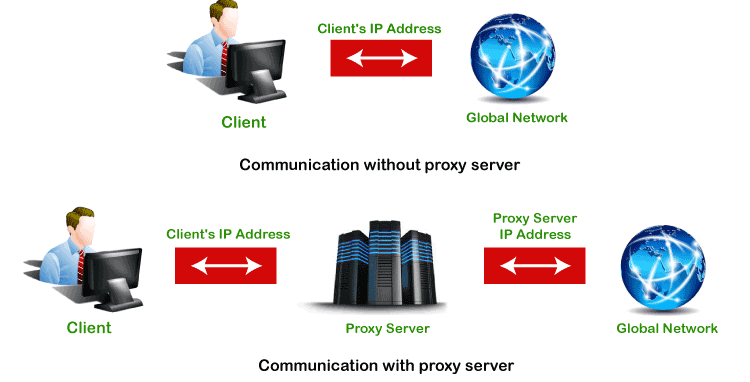Within the current digital landscape, proxies play a key role in improving privacy, security, and convenience while traversing the vast ocean of the internet. But, what exactly is a proxy server, and how does it work? Basically, a proxy server acts as an intermediary between your gadget and the websites you wish to access. By directing your online traffic through another host, it can conceal your IP address and help protect your identity online. This functionality opens up a realm of possibilities for users, from enhancing online safety to bypassing geographical restrictions on content.

Nevertheless, the benefits of using proxies extend far beyond mere anonymity. Businesses leverage them to bolster data protection, while users utilize them to navigate streaming services and online gaming with greater ease. Moreover, the field of data scraping and competitive intelligence has seen proxy servers become essential tools for market research. Understanding the various types of proxy servers—such as HyperText Transfer Protocol, SOCKS, or home proxies—along with their distinct benefits and risks, can empower users to make educated decisions about their online strategies. From non-professional users to large-scale organizations, the life of a proxy server is integral to molding our interconnected digital experiences.
Comprehending Proxy Server Concepts
Proxies serve as middlemen between individuals and the online world. When a user requests a request to access a web page, the demand is first forwarded to the proxy, which then routes it to the intended site. The site's reply goes back to the proxy before getting to the user. This method conceals the client's original IP address, enhancing security and allowing for the modification of demands and answers.
There are various forms of proxy servers, each fulfilling different roles. HTTP proxies handle HTTP requests, while SOCKS proxies can manage any type of data, making them adaptable for various uses. Open servers, on the other hand, do not change requests or answers but can be used for storing web content or screening. Grasping these variations helps users choose the right proxy server for their individual needs.
The function of a proxy server extends outside just anonymity; it also has a significant part in security and functionality. By acting as a buffer, proxies can screen harmful content, prevent undesired traffic, and shield against online threats. Additionally, they can boost internet speed by storing frequently accessed content. As web usage continue to expand, the importance of proxy servers in upholding safety and efficiency cannot be overstated.
Advantages and Drawbacks of Using Proxies
Using proxy servers offers multiple significant advantages. One of the key benefits is enhanced online security. By masking your IP address, proxies help you protect your anonymity while browsing the internet, which is notably useful for protecting personal data from advertisers and possible malicious actors. Additionally, proxy servers can help users overcome geo-restrictions, granting access to material that might be not accessible in their location, such as particular streaming services.
However, using proxy servers also comes with certain risks. Not all proxies are secure, and some may monitor your online activity, posing a danger to your security instead of protecting it. Free proxy services, in particularity, often jeopardize user security, likely exposing sensitive data to third parties. Furthermore, relying on inconsistent proxy servers can lead to slower internet speeds and disconnects, negatively impacting your overall surfing experience.
Another important point is the risk for misuse. Check out here may exploit proxies for nefarious purposes like scraping data from sites without authorization or engaging in other unethical online activities. This can not only result in legal ramifications but also subject the user to bans and punishments from websites. Therefore, while proxies can be a useful tool for enhancing privacy and security, users must be vigilant and choose legitimate services to minimize related risks.
Proxy Servers in Enterprise and Media
In the business world, proxies play a critical role in enhancing online security measures. Businesses utilize these servers to monitor internet traffic, ensuring that workers adhere to web usage policies while also protecting private data. By routing requests through a protected proxy, companies can filter out dangerous content and block access to potentially unsafe sites, creating a protected online environment. This not only helps in mitigating the threat of online attacks but also improves overall productivity by reducing disturbances.
In the realm of media, proxy servers are instrumental for individuals wanting to access geo-restricted content. Video streaming platforms often limit access based on a viewer’s location, but with the use of proxies, people can bypass these restrictions seamlessly. Proxies allow individuals to mask their internet protocol addresses with one from a alternative region, granting them access to premium shows, movies, and live events that may not be available in their region. This capability enhances the watching experience and opens up a wide library of content that many desire.
Moreover, proxy servers can substantially improve the performance of web tasks such as gaming and streaming. They can reduce lag and lag, ensuring a more seamless experience for gamers who rely on real-time interactions or high-speed data transfer. Companies also benefit from this improved performance, as proxies can help in data scraping and market research by managing many requests simultaneously without overwhelming the servers they target. This dual benefit of enhanced performance and security makes proxy servers a valuable tool in both business and entertainment settings.
